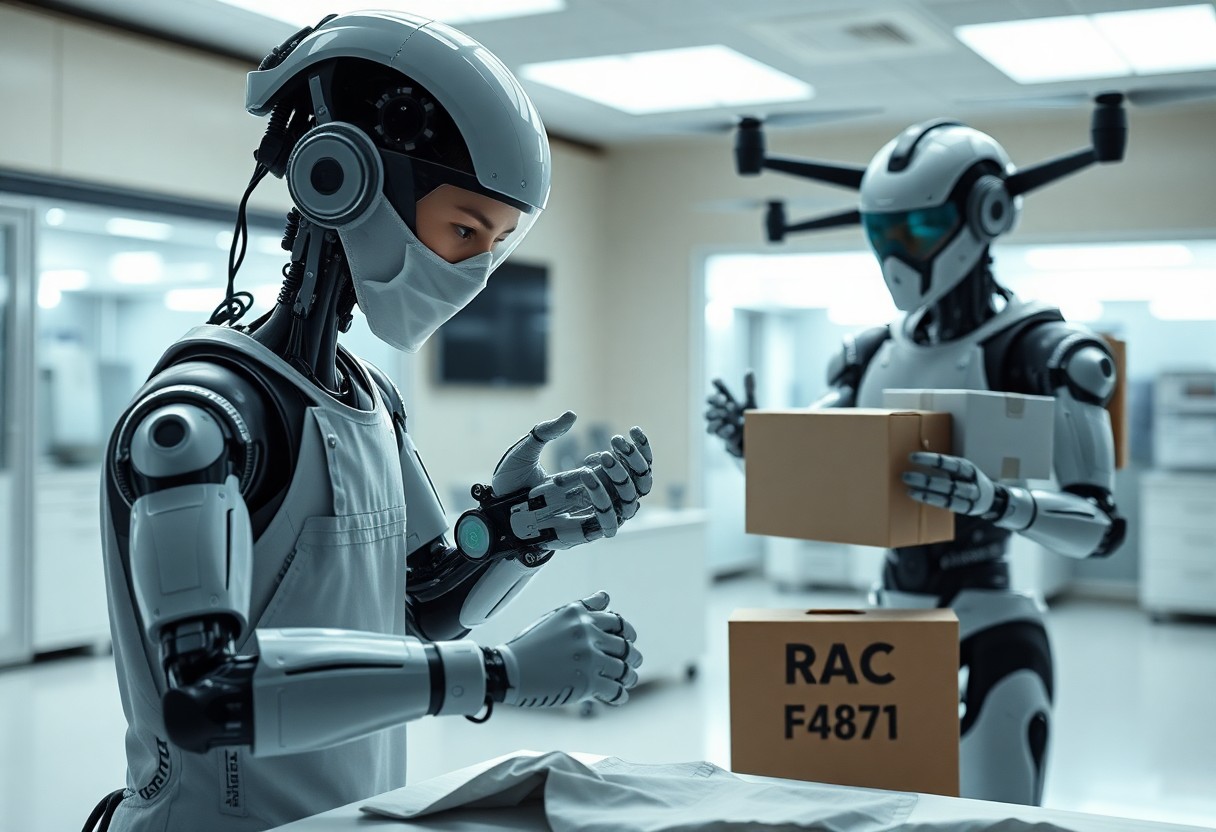Ethics surrounding the deployment of autonomous assassins presents a complex landscape that raises significant questions about accountability, decision-making, and moral responsibility. As technology advances, you may find yourself grappling with the implications of machines determining life or death, often devoid of human oversight. The potential consequences of such systems challenge traditional notions of warfare, justice, and human rights. In this post, you will explore the ethical dilemmas that emerge as society navigates the intersection of advanced robotics and armed conflict, prompting a reevaluation of the values that guide military engagement.
Definition of Autonomous Assassins
A autonomous assassin refers to a type of military weapon system capable of identifying, targeting, and engaging enemy combatants without direct human intervention. These systems rely on artificial intelligence and machine learning algorithms to make decisions on the battlefield, thereby significantly changing the landscape of modern warfare. As you explore this topic, consider the ethical implications these technologies bring to the forefront of military strategy and human life.
Overview of Autonomous Weapons
Around the world, military forces are increasingly investing in autonomous weapons systems. These advanced technologies are designed to operate independently, which can enhance operational efficiency and reduce risks to human soldiers. However, the shift towards these systems raises important considerations about accountability, ethical decision-making, and the potential for misuse on the battlefield.
Technological Advancements in Warfare
Assassins today are evolving at a rapid pace, thanks to breakthroughs in artificial intelligence, machine learning, and robotics. These advancements enable machines to process vast amounts of data and make split-second decisions in combat scenarios. This evolution allows for heightened accuracy and efficiency but also leads to significant moral dilemmas regarding the absence of human judgment in life-and-death situations.
But while technological advancements improve the precision and efficacy of military operations, they also pose critical questions about the ethics of life-taking decisions made by machines. As you probe into these developments, consider how a lack of human oversight in autonomous assassins may lead to unintended consequences, including collateral damage and a diminished sense of accountability. The balance between technological innovation and ethical responsibility becomes imperative as you navigate these complex discussions on warfare’s future.
Ethical Considerations
There’s a pressing need to explore the ethical implications of deploying autonomous assassins, as these technologies challenge existing moral frameworks. You must consider how the deployment of such systems intersects with concepts of human dignity, the right to life, and the potential for unintended consequences on innocent lives. The ramifications of giving machines the power to make life-and-death decisions raise fundamental questions about your values and the ethical limits of technological advancement.
Moral Implications of Autonomous Killing
Around the globe, discussions regarding the moral implications of autonomous killing are intensifying. As you reflect on the nature of warfare, you might question the justifications behind using machines to execute human targets. The dehumanization inherent in this process could lead to an erosion of societal values concerning life and death and diminish empathy in conflict situations.
Accountability and Responsibility
Considerations around accountability and responsibility in the deployment of autonomous assassins present significant ethical dilemmas. You are tasked with understanding who is held accountable when a machine makes a lethal mistake—whether it is the programmers, the military command, or the manufacturer. The challenge lies in determining the extent of human oversight required to ensure moral agency remains intact.
It is vital to examine deeper into the nuances of accountability and responsibility. You should ask yourself, can a machine truly possess moral agency? If an autonomous assassin makes an erroneous decision, who do you deem responsible? Understanding the chain of command and the role of human oversight is vital when contemplating the ramifications of deploying these systems. As technology advances, you are called to grapple with these questions to establish a framework that holds parties accountable while also respecting the sanctity of life.
Legal Framework
You must understand that deploying autonomous assassins raises complex legal challenges that intersect with both international and national laws. The legal framework governing such technologies remains undeveloped, which complicates accountability and oversight. As you explore into these challenges, consider how existing laws may adapt, or fail to adapt, to the nuances of automation in warfare.
International Humanitarian Law
International humanitarian law governs the conduct of armed conflict and seeks to protect those not participating in hostilities. It mandates principles like distinction, proportionality, and necessity. You should assess how autonomous assassins align with these principles, as their deployment could undermine established protections for civilians and combatants alike.
National Regulations and Policies
Behind the international treaties, each nation has its own legal framework addressing the use of autonomous weaponry. National regulations can vary widely, reflecting a country’s stance on ethics and technology in warfare. You should analyze how these laws might impact the deployment of such systems and the potential liabilities involved.
To fully appreciate national regulations and policies regarding autonomous assassins, you need to explore how countries approach the integration of artificial intelligence in military operations. Some nations have enacted stringent controls to ensure compliance with international legal obligations, while others may lack robust guidelines, leading to potential misuse. Understanding this landscape will help you anticipate the legal implications and ethical responsibilities involved in deploying autonomous lethal systems.
Psychological Impact
For those involved in the deployment of autonomous assassins, the psychological ramifications can be profound. You may find yourself grappling with the moral implications of using machines in lethal operations, as these decisions affect not only combat outcomes but also your own mental state. Explore more on these topics in this insightful article about Autonomous Agents and Ethical Issues: Balancing ….
Effects on Operators
Between the responsibility of controlling a machine that can take lives and the emotional detachment encouraged by automation, operators often experience a complex array of feelings. You may find that this dichotomy leads to an overwhelming sense of anxiety or disconnection, impacting your psychological well-being as you navigate this challenging landscape.
Societal Perceptions of Warfare
An evolving perception of warfare is emerging as autonomous assassins become more integrated into conflict. You should consider how the introduction of these technologies alters public opinion about military engagement and accountability, prompting debates around ethics and legitimacy in warfare.
At the societal level, the use of autonomous assassins shifts narratives around warfare from traditional heroism and sacrifice to discussions focused on technology and dehumanization. You might notice a growing concern among the public regarding the moral implications of relying on machines to conduct warfare, which can lead to increased scrutiny of military actions and governmental transparency. Understanding these shifts can help you engage in informed conversations about the future of conflict and the role of emerging technologies.
Case Studies
Despite the significance of autonomous assassins in modern warfare, various case studies illustrate the ethical dilemmas they present. Here are some notable examples:
- 2010: The use of drones in Afghanistan resulted in 4,000 targeted strikes with a civilian casualty rate approximating 12%, raising concerns about accountability.
- 2016: The Pentagon announced the development of Robotic Autonomous Systems (RAS), highlighting the risks in its proposal for operational frameworks.
- 2020: Reports indicated that a Turkish drone autonomously engaged targets in Libya, sparking fierce debates over self-targeting technology.
- 2021: The UN called for a moratorium on lethal autonomous weapons following the emergence of ethical implications during testing phases.
Historical Context of Autonomous Weapons
Context is imperative when examining autonomous weapons development. Early innovations, such as the automated artillery of World War I, laid the groundwork for later advancements. The increasing reliance on unmanned systems, particularly in the Gulf War, marked a transition in military strategy, where technology began to play an integral role in decision-making processes.
Recent Developments and Incidents
About recent events, the landscape of autonomous weapons has evolved dramatically. High-profile incidents involving drones have raised alarms about their autonomy and decision-making capabilities. You may find that nations are investing heavily in these technologies, amplifying concerns regarding regulatory measures and ethical implications on the battlefield.
At this pivotal moment, the emergence of new technology, such as AI-driven systems, intensifies the urgency for regulatory frameworks. Reports suggest that countries are advancing their autonomous capabilities, revealing a lack of consensus on ethical guidelines. This confusion can potentially lead to unintended consequences, including increased civilian casualties and escalation of conflicts, which you should consider when assessing the implications of autonomous assassination technologies.
Future Implications
Now, the deployment of autonomous assassins is set to reshape not just military engagements but also the fabric of international relations and security protocols. As you contemplate the future, consider how countries might rely on these technologies, potentially escalating conflicts and diminishing the human element in warfare. Your perspective on military ethics will be challenged as you grapple with the acceptance and normalization of these technologies in society.
Evolution of Warfare Strategies
Future warfare strategies will inevitably evolve as militaries adopt autonomous assassins into their arsenals. You can anticipate a shift in how battles are fought, focusing more on technology and algorithms than on traditional tactics. As these systems become more widespread, your understanding of combat and engagement may shift dramatically.
Haunting Ethical Dilemmas
Dilemmas surrounding the use of autonomous assassins will continue to provoke deep ethical questions. As you explore into these issues, consider how accountability, decision-making, and the value of human life intersect with unmanned systems capable of lethal force.
To navigate these haunting ethical dilemmas, you should explore questions about responsibility in the event of wrongful deaths or collateral damage attributed to autonomous systems. Evaluate whether accountability lies with the designers, operators, or the machines themselves. Your discussions will inevitably touch on complex notions of morality, consent, and the implications of programming machines to make life-and-death decisions. By doing so, you can better understand the challenges humanity faces in an age where technology intersects profoundly with ethical considerations.
Summing up
Drawing together the ethical quandaries surrounding the deployment of autonomous assassins, you must consider the implications of decision-making without human oversight. As the potential for collateral damage increases, questions about accountability and moral responsibility become pressing. You need to examine how these technologies impact warfare ethics and civilian safety, as well as the potential for misuse or escalation in conflict. Ultimately, your understanding of these issues is vital in navigating the complex landscape of modern warfare and ensuring that ethical considerations guide the future of military innovation.






